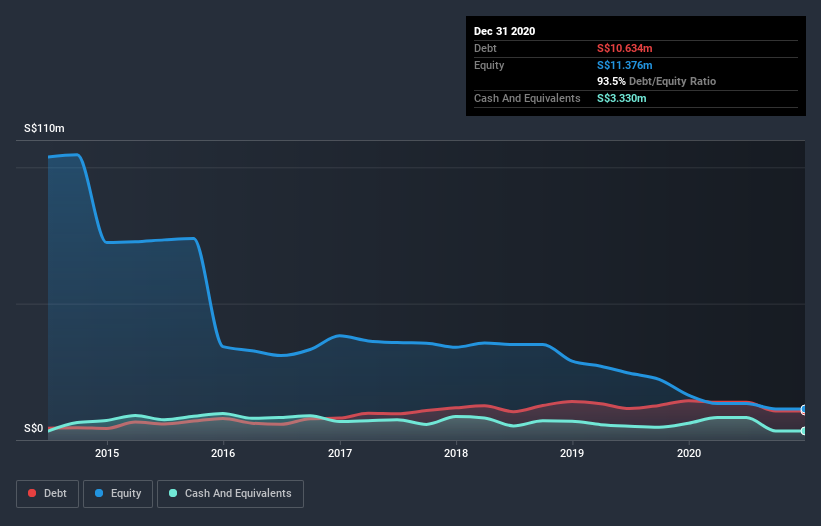Does Acma (SGX:AYV) Have A Healthy Balance Sheet?
Warren Buffett famously said, 'Volatility is far from synonymous with risk.' So it might be obvious that you need to consider debt, when you think about how risky any given stock is, because too much debt can sink a company. As with many other companies Acma Ltd. (SGX:AYV) makes use of debt. But the real question is whether this debt is making the company risky.
When Is Debt A Problem?
Debt is a tool to help businesses grow, but if a business is incapable of paying off its lenders, then it exists at their mercy. In the worst case scenario, a company can go bankrupt if it cannot pay its creditors. While that is not too common, we often do see indebted companies permanently diluting shareholders because lenders force them to raise capital at a distressed price. Of course, plenty of companies use debt to fund growth, without any negative consequences. When we think about a company's use of debt, we first look at cash and debt together.
Check out our latest analysis for Acma
What Is Acma's Debt?
The image below, which you can click on for greater detail, shows that Acma had debt of S$10.6m at the end of December 2020, a reduction from S$14.4m over a year. On the flip side, it has S$3.33m in cash leading to net debt of about S$7.30m.

How Strong Is Acma's Balance Sheet?
Zooming in on the latest balance sheet data, we can see that Acma had liabilities of S$39.3m due within 12 months and liabilities of S$7.33m due beyond that. Offsetting this, it had S$3.33m in cash and S$25.3m in receivables that were due within 12 months. So its liabilities total S$18.0m more than the combination of its cash and short-term receivables.
This deficit casts a shadow over the S$3.82m company, like a colossus towering over mere mortals. So we definitely think shareholders need to watch this one closely. After all, Acma would likely require a major re-capitalisation if it had to pay its creditors today. The balance sheet is clearly the area to focus on when you are analysing debt. But it is Acma's earnings that will influence how the balance sheet holds up in the future. So if you're keen to discover more about its earnings, it might be worth checking out this graph of its long term earnings trend.
In the last year Acma had a loss before interest and tax, and actually shrunk its revenue by 34%, to S$59m. That makes us nervous, to say the least.
Caveat Emptor
Not only did Acma's revenue slip over the last twelve months, but it also produced negative earnings before interest and tax (EBIT). Indeed, it lost a very considerable S$5.3m at the EBIT level. Combining this information with the significant liabilities we already touched on makes us very hesitant about this stock, to say the least. That said, it is possible that the company will turn its fortunes around. But we think that is unlikely since it is low on liquid assets, and made a loss of S$5.3m in the last year. So while it's not wise to assume the company will fail, we do think it's risky. When analysing debt levels, the balance sheet is the obvious place to start. However, not all investment risk resides within the balance sheet - far from it. We've identified 2 warning signs with Acma (at least 1 which shouldn't be ignored) , and understanding them should be part of your investment process.
If, after all that, you're more interested in a fast growing company with a rock-solid balance sheet, then check out our list of net cash growth stocks without delay.
When trading Acma or any other investment, use the platform considered by many to be the Professional's Gateway to the Worlds Market, Interactive Brokers. You get the lowest-cost* trading on stocks, options, futures, forex, bonds and funds worldwide from a single integrated account. Promoted
New: Manage All Your Stock Portfolios in One Place
We've created the ultimate portfolio companion for stock investors, and it's free.
• Connect an unlimited number of Portfolios and see your total in one currency
• Be alerted to new Warning Signs or Risks via email or mobile
• Track the Fair Value of your stocks
This article by Simply Wall St is general in nature. It does not constitute a recommendation to buy or sell any stock, and does not take account of your objectives, or your financial situation. We aim to bring you long-term focused analysis driven by fundamental data. Note that our analysis may not factor in the latest price-sensitive company announcements or qualitative material. Simply Wall St has no position in any stocks mentioned.
*Interactive Brokers Rated Lowest Cost Broker by StockBrokers.com Annual Online Review 2020
Have feedback on this article? Concerned about the content? Get in touch with us directly. Alternatively, email editorial-team (at) simplywallst.com.
About SGX:AYV
Acma
An investment holding company, engages in the distribution of air conditioning and ventilation systems in Singapore, Europe, rest of Asia, North America, and internationally.
Flawless balance sheet and good value.
Market Insights
Community Narratives




